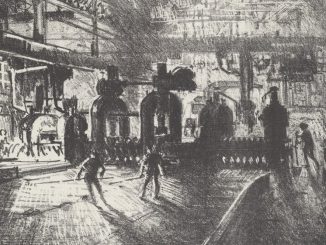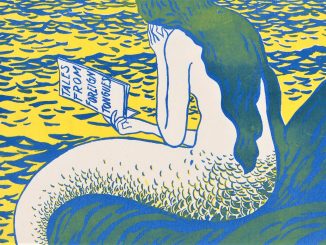![Jean Honoré Fragonard, The Stolen Kiss [The Met]](https://www.thenasiona.com/wp-content/uploads/2020/02/Love-Letters-1-1030x438.jpg)
I had very little freedom as a teen in Iran. My stepfather kept a close eye on me. He used to drop me off and pick me up from school to make sure I wasn’t doing anything to “damage our family’s reputation,” so the only time I could be alone was when I cut classes and hung out down by the beach. We had moved away from the busy city of Tehran to a deserted town on the Caspian Sea, because my mother suffered from severe social anxiety and couldn’t deal with any noise. As a kid, I used to love being there and looked forward to summer vacations, but as a teen, life there felt small, isolated and lonely.
The days I was able to skip school, I’d run to the beach, sit by myself on the soft sand, and smoke a few loose cigarettes I’d buy from beachfront vendors. I’d feel safe with the ocean breeze on my face, the sight of seagulls fighting over their catch of the day, and curious stray dogs who would come to check me out for a few moments before losing interest.
One day I noticed a boy down by the beach, smoking too. I watched him as he skipped large rocks across the surface of the sea. I pretended I didn’t see him, but I was fascinated with the way his rocks bounced on top of the water so many times before they sank. Sometimes he would wave at me, and I would wave back. Our waving game went on this way for months. Any time he tried to walk toward me, though, I would get up and run away. The truth is, I didn’t know what I’d say to him if we met.
Then one day he was gone. Each day, I’d leave my last class and run down to the beach in the hope of running into him. Each day, I’d go back to school disappointed, just in time for my stepfather to collect me. Sometimes, from across the street, I’d watch my stepfather marching back and forth in front of my school gate, searching for my face among the crowd of girls in the black school uniform that covered us head to toe. I liked hiding among the other girls so he couldn’t tell which direction I came from until I was right in front of him. My stepfather was pleased with himself for being able to control me, and I was pleased that he couldn’t.
But I was sad about losing my rock-skipping friend and not knowing where he went. I learned how to skip rocks myself and, in this way, I kept our connection alive.
After six months of waiting, I saw a figure on the beach walking towards me. He walked purposefully. As he got closer I recognized him. His hair had all been shaved off. He had a round face with big, hazel eyes and long eyelashes. I noticed he was wearing a military uniform.
“I’ve thought about you so much over the last six months,” he said. “What’s your name?”
“Atash,” I said. “What’s yours?”
“Reza,” he said. “The morals police arrested me. For nothing. And because I wasn’t in college, they made me do military service. I didn’t even get to say goodbye to my family. They took me straight to the Iraqi border.” He was talking fast. His training was intensive, before he knew it, he was on the front, shooting a gun. He saw dead people and all sorts of horrible things. “I’m only home for three days,” he said. “I have to go back soon, but I want to write you letters. Where do you live? How old are you? Can I write you? Will you wait for me?
I didn’t know which question to respond to first. I was more focused on his sweet sounding voice, not on what he was actually saying. So I said, “I have to go home now. If I don’t go home, I’ll never be able to see you again.” I told him about my mother and stepfather and how I never felt safe with them. I trusted Reza, maybe because I knew he was going away. He looked concerned, but didn’t seem to judge me. He held my hands with tears in his eyes. I took his address. “I’ll write to you and tell you where to send your letters,” I told him.
I needed a friend to intercept Reza’s letters for me, but I wasn’t very well liked at school and I couldn’t stomach all the girls’ giggling about suitors and boys. There was one girl, though, named Shirin, who seemed like a potential ally. My classmates picked on her because she looked like a boy. They’d call her “Hideous Girl” each time she passed. I liked that she looked masculine.
I stopped going to the beach at recess; instead, I would sit near the big tree that Shirin read under. “What are you reading?” I asked her one day.
“Dorogh-e Bozorg” she said. “The Big Lie. It’s a love story and it’s banned.”
“I only read books that are banned,” I assured her.
I offered her some of my lunch and we ate together without talking. When the bell rang, we got up to go to class. In class, she asked me if I’d like to change my seat and sit next to her. I accepted, and moved to the back of the class where she always sat to avoid the insults of other kids.
“I have a boyfriend,” I told her. “He’s a soldier. We don’t talk or see each other much, but we like to skip rocks together.”
She laughed. “How romantic,” she said.
“Could you get his letters for me if he sends them to your place?”
She gave me a strange look, but she nodded.
Shirin and I hung out every day and even had sleepovers at my house. She warmed herself to my mother by giving her lots of compliments, washing dishes after dinner, and helping with cooking and baking.
According to Shirin, her parents didn’t mind her staying with us. They were happy to feed one less person. Eventually, Shirin started to spend every night at my house and sleep with me in my bed.
“My mother is only nice to you because she wants you to help convince me to marry my cousin,” I told her one night.
“Well I’m not buying it,” Shirin said. “Besides, no one can make you say yes to getting married. Remember that. They might force you into a wedding, but they know full well that when the imam comes, you can always tell him no and he’ll be forced to stop the ceremony.”
“I want out of this house,” I said. “I can’t get dressed up in white and go through all that just to say no. They’d kill me. I either have to get married or run away, and I can’t marry my cousin, so I guess I have to run away. That’s the only way. Besides, I’m failing all my classes too. There’s no future here for me.”
“Let’s go to sleep, Atash. Come to bed.”
I fell asleep immediately. I slept for a few hours and then woke up in the darkness of the night. I felt a soft touch on my inner thighs. Shirin was breathing heavily on my skin, too. I was excited, but this excitement was different than any other I’d known before. It was strange to hear my heartbeat so clearly and loudly. I didn’t know what to do with what I was feeling, so I did nothing. I continued acting like I was asleep. I wanted to see how far she would take this. Shirin’s hand began to move to the elastic of my underwear. Her fingers were moving slowly up across my belly and back down to my thighs again, like she was playing a soft song on a piano.
But then I imagined her getting violent, or not being able to stop. I imagined Shirin attacking me and tearing at my skin. Who is this person, anyway? I thought, and remembered what the kids in school had said: She’s really a boy. My body convulsed. Shirin pulled her hands away from me all at once and turned over onto her other side. I opened my eyes and stared at her back wishing I hadn’t moved.
After that night, there was an obvious distance between us. Shirin still came over, but every morning upon rising, I would change my clothes in the bathroom out of sight from her.
I missed Reza. I wanted to skip stones with him, maybe even kiss him. I was grateful that Shirin brought me letters from him weekly. I was impressed with his dedication. His words were powerful and gave my life meaning. He wrote to me from the war front. I wrote too, but not as much as he did. I really only had bad news to report and I didn’t know what else to write about.
As my mother’s plans to marry me off to my cousin progressed, I realized I was going to have to tell Reza what was going on at home. Finally, I broke down in one of my letters and told him I was probably going to be leaving Iran in just a short time. “If I don’t leave, I’ll be married,” I told him. “Either way, there’s just no way for us to be together right now.” I got a letter back immediately. “Please buy time, any way you can. I promise I’ll be home soon. I’ll get you out of this.”
I thought about Reza all the time. I imagined him on the Iran-Iraq border, in the middle of battle, finding a quiet corner to write. He was fighting for his life and still finding time to express his feelings toward me. How could I refuse to wait for him?
Shirin loved reading his letters to me on the phone. When she couldn’t come over it was her favorite pastime.
“Oh, there is one more letter,” she would say. There were always more letters than I expected. “Can I read it to you?”
“No,” I’d always reply. “I’ll see you at school tomorrow.” I knew my stepfather would be listening to my conversation from the telephone in the other room.
The next day, as we sat together to memorize a few couplets from Hafez and Rumi, Shirin pulled out a letter from Reza and read it to me. She recited it in a funny, low voice, like that of a man: “Hello my love, my fire, my life…” I started laughing uncontrollably to hear those words coming from her mouth. “You must wait for me, my sweet. I’ll be there to hold you and caress you.” As Shirin read, though, she gradually slipped into her own, soft voice. I preferred that more; it came across as more romantic, more true. “You are the light that keeps me alive.” “You are my hope.” I was thrilled by how poetic he was. Anyone who can write like this shall have my heart, I thought.
One day, while my parents were out, the phone rang. I got up and answered it.
“It’s me, Reza,” the voice on the other end of the phone said.
“Reza? Salaam,” I whispered. I could hardly get out any other words. I was holding onto the kitchen wall.
“I’m a few blocks away from your house. I must see you.”
“You’re here?”
“Yes, just a few houses down.”
“I’ll be right out. I’ll have to come with my little sister, though. I’m babysitting her.”
I walked over to the mirror and looked at myself. My sister was staring at me.
“Well,” I said, smiling at her. “How do I look?”
“If I help you, you have to do my homework for me,” she said. She meant business.
Twenty minutes later, I was walking down the street in the turquoise headscarf I had finally settled on, holding my sister’s little hand. Three houses down was another house that looked identical to ours, except that it had a large row of full trees covering it. It belonged to a neighbor who only used it in the dead of summer, and since it was May, it was deserted. I surveyed the territory and saw that it made a perfect rendezvous: it was hidden enough to kiss in, but was also a short distance from home if a quick escape had to be made. I positioned my sister on the front porch where she could watch for my stepfather’s car; then I slipped around back.
I found Reza on the back porch. He stood up, holding a few gifts wrapped in white and pink. He opened his mouth a few times to say something, but each time he seemed unable. Finally, he took one of my hands and placed it on his chest. I noticed he was wearing a crocheted hat over his shaved head. It made him look a little girly, but I liked it. “Atash,” he said after a while, “Your letters were so beautiful. I read all three of them so many times. I can’t believe what your family is trying to make you do.”
“I know,” I said, tears welling up in my eyes. “I was so happy to know you were coming to save me.”
He looked at me seriously. “Atash, how could I save you? You know I have to return to my military service.”
I was startled. “I bought time,” I said, “Just like you asked me to. I don’t know what your plan is. Whatever you meant in your letters I’m sure will be fine.”
“Atash,” he said, leaning in close to me. “All my letters to you were returned. I have them all right here.” He reached into an inner pocket of his coat and pulled out a few envelopes. “You see?” he said, pointing at the little stamped marks on each: “Bargasht. Returned.”
“Reza, what are you saying?” I heard my voice getting louder. “You responded to every sentence I wrote in those letters. Don’t you remember? ‘My love, my fire, my life…’”
“Who has been writing you letters?” Reza’s eyebrows arched and his body began to tremble. He grabbed my arms and held me close to him. “What’s his name?”
“Atash! Atash!” My sister came running around the side of the house. “Mommy and Baba are coming!” I grabbed Reza’s letters out of his hand and ran home. We ran into the living room, sat down on the couch, and quickly pretended to be doing our homework.
That night, after dinner, I rushed to my room to study the envelopes I had grabbed from Reza and the letters inside them. None of them started with “My love,” “My fire,” or anything like that. They were all polite, but mostly focused on the war and the terrible things he’d seen at the front. In several of them, he brooded over the fact that other letters he’d tried to send had been returned. I couldn’t connect to his letters at all.
The next day, I was distraught. All the way to school, I kept breaking down and crying. When I got to school, Shirin was waiting for me. “Salaam,” she said, “What’s wrong? You look terrible.”
“My parents again,” I lied.
“Bastards,” she said. “Don’t worry, I have good news. I got another letter from Reza for you.”
I felt like I had just been thrown into a lower hell, but for some reason I couldn’t stop her from continuing her game. “Yes,” I said. “Nothing would make me happier than to hear from him right now.”
That night I invited Shirin over to study. When she arrived and I saw the enthusiastic expression on her face, I asked my mom to excuse us from dinner early. I told her that we had a lot of math homework to catch up on. Shirin looked nervous. Perhaps she knew I found out about the letters. I could feel her close to me as she followed me to my room. As soon as we were inside I locked the door. I stood there watching tears forming in her eyes.
“Are you okay?” She asked.
“I know about the letters.” I said.
“I’m sorry.” She said.
“Don’t be.” I said as I took off my T-shirt, then bra.
I could hear how heavily she was breathing.
Shirin smiled and took off her tunic. She sat on my bed, watching me undress bit by bit, till I was only wearing underwear.
“Your parents … ?”
“Shhhh … Don’t talk. We’re ‘studying’.”
This was the first time I was choosing to have sex. I’d never heard about girls being with other girls. All I knew was that I’d never forget this moment. I got to decide each move: where, how. This was the first time sex was going to be about love instead of something imposed on me by some creepy adult.
“Do you?”
“Do I what?
“Do you love me?” I asked.
“You really have to ask?
“Tell me,” I said.
“You are my love, my fire, my life.”
AUTHOR

Atash Yaghmaian was born in Tehran, Iran, and has lived in the U.S. since 1990. She is the recipient of 2020 Ruminate Magazine’s VanderMey Nonfiction Prize for her story, “How to Ruin a Persian Wedding.” She has contributed to CounterPunch Magazine and runs a blog at mynamemeansfire.com. Atash is a founding member of Harvest Collegiate, a progressive public high school in Manhattan, where she serves as the Director of Counseling. Atash is currently working on a full-length memoir called My Name Means Fire.


